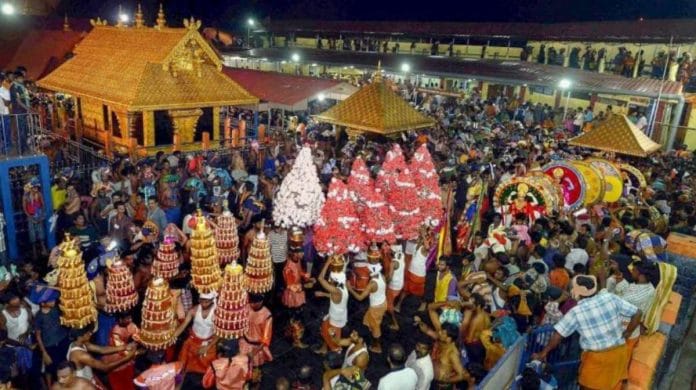Bengaluru: As many as 39 people, including pilgrims, have tested positive for Covid-19 after the two-month-long annual pilgrimage season at Sabarimala’s famous Lord Ayyappa Temple began last Monday.
Located in Pathanamthitta district of Kerala, the temple’s Mandalam-Makaravilakku pilgrimage season began on 16 November and will continue till 20 January 2021.
Officials in the Pathanamthitta deputy commissioner’s office told ThePrint that pilgrims are being tested at various points in and around the temple. The results of the 39 people came in on Thursday, they said.
Of the 39 Covid-positive individuals, 27 are employees of the Travancore Devaswom Board, which manages the temple, said board officials.
The remaining are pilgrims and police personnel, who are responsible for manning the temple.
All the Covid-positive temple employees were immediately shifted to a Covid care centre for treatment, said an official of the management board.
Temple officials said they will now ramp up testing, but the onus is also on the pilgrims to ensure they follow Covid protocols in toto
During a normal season, the Sabarimala temple sees close to 50,000-80,000 pilgrims visiting the shrine daily. But due to Covid restrictions this year, the Kerala government capped the number of visitors to 1,000 a day on weekdays, and 2,000 on weekends.
But the number of pilgrims is expected to increase when the auspicious Mandala pooja will be held on 26 December.
ThePrint reached Travancore Devaswom Board President N. Vasu and Kerala Devaswom Minister Kadakampally Surendran through phone calls and text messages for a comment on the matter, but there was no response till the publishing of this report.
Also read: As Sabarimala issue fizzles out, BJP has gained virtually nothing in Kerala
‘Testing will be more aggressive’
Asked how they plan to take control of the situation, a temple board official said: “Testing will be more aggressive and pilgrims will have to strictly follow the protocols.”
“We have antigen testing facilities at various points for the devotees, including bus stands and railway stations. We will have to try and keep it under control, and the onus is also on the pilgrims to ensure they do not violate protocols,” the official said.
Though Kerala has not been able to effectively contain the spread of the virus as it did when the pandemic broke earlier this year, health experts had warned the state government of a spike in cases during the Sabarimala season. The state government, however, said they were confident of handling the situation.
The Pinarayi Vijayan-led LDF government announced its decision on 28 September to reopen the temple, stating that “Sabarimala is the most important pilgrimage centre in our state”.
“In the wake of the Covid pandemic, it has been decided to hold this year’s Mandala Makaravilakku pilgrimage with a limited number of pilgrims without symbolically reducing any rituals,” the chief minister had said.
Steps to check the virus spread
The temple authorities had earlier put in place several rules to ensure there’s no community spread.
The pilgrims are now required to register themselves through a virtual queue via the temple’s website. Only those who book through this system will be allotted a particular day to visit the shrine.
Devotees are also not allowed to stay within the temple premises. Masks have been made mandatory even when devotees climb the holy hill, but bathing in the river as is the ritual has been barred.
“Instead, sprinklers or shower systems have been installed for bathing at Pampa,” said a senior official from the state Covid war room.
The temple authorities are also distributing the much sought-after medicinal drinking water among the devotees in steel bottles to avoid the risk of the virus spread.
Also read: How Supreme Court bench on Sabarimala review differs on faith and law






